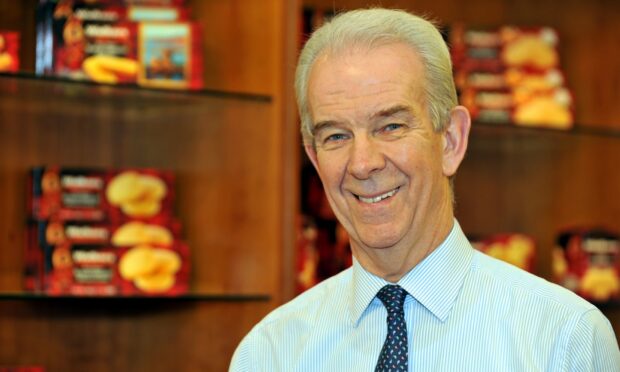Walker’s Shortbread is looking to improve on its 2021 trading performance as it emerges from the twin challenges of the pandemic and supply chain woes triggered by war in Ukraine.
Former joint managing director Sir Jim Walker, now simply a director following a change at the top earlier this year, told The Press and Journal an operating profit margin of 4.4% in 2021 was “substantially short” of what the board considered an acceptable return.
The iconic Moray shortbread-maker is focused on a “more profitable future,” he said.
Sir Jim was speaking after the Aberlour-based firm posted accounts showing pre-tax profits nearly doubled to £6.8 million last year, from £3.6m in 2020.
Soaring energy bills and inflation in double digits have seen the business pass on some of its extra costs to customers.
Sir Jim said it had been a “very, very difficult couple of years” due to Covid and supply problems.
He added: “Pre-tax profits did virtually double (in 2021) but were behind where we were. We are hoping it will gradually build back.”
Cautious outlook
But the company is “still looking at the future with some caution”.
He added: “This year is still very uncertain because of increasing raw materials and utilities – everything is shooting up at an unbelievable rate. Because of the war in Ukraine there is still some uncertainty.
“Butter has virtually doubled and the price of flour has gone up as well.”
Sir Jim’s nephew, Nicky Walker, a former Aberdeen FC goalkeeper and now MD at the family firm, said: “2021 was an incredibly challenging year to navigate.
“We’re pleased with the results and the return to pre-pandemic trading levels.
“We could not have done this without the support of our incredible workforce who have demonstrated time and again that they step up when required.
“The successful roll-out of the vaccine programme assisted with a return to a more efficient operating model, which was welcome given the uncontrollable external challenges – specifically in labour availability.
Business ‘significantly impacted’ by increased costs
“We accept the trading conditions in 2022 are equally, if not more, challenging given the many difficulties facing world economies.
“But we are committed to transitioning the business accordingly to maintain a sustainable footing for the future.”
The MD added: “The Walker’s brand relaunch is progressing well through 2022 and will continue into next year as we focus forward to support the business’ aspiration for sustainable growth.”
Walker’s said it was “impacted significantly” by increased costs and delays in receiving key raw materials in 2021.
Supply side issues were “pronounced in the latter half of the year”, with the firm shouldering rising costs in freight and transport.
The spectre of high inflation remains a challenge, in common with all businesses.
Meanwhile, the board has paid tribute to the company’s other former joint managing director, Joe Walker, Sir Jim’s brother, who died last year aged 83.
Bosses hailed Joe’s “immeasurable contribution” during his 66 years at the company.
The board also acknowledged the 60 years’ service of Sir Jim, who received his knighthood in the late Queen’s Birthday Honours earlier this year.
He and his late sibling jointly led the business founded by their grandfather, Joseph Walker.
‘Privileged’
Sir Jim said: “I’ve been privileged to help to develop the company over many years and am very pleased to support the appointment of Nicky as managing director.
“He has had 25 years of experience in the company and will be fully supported by a strong team of family and non-family directors and managers.”
During the 12 months to December 31 last year, Walker’s recorded turnover of £132.4m, up from £142.4m in 2020. Export revenue jumped to £79.8m, from £72.6m.
Profits were driven by growth in overseas markets as demand in key territories remained strong.
Seasonal festive markets at home and abroad also delivered growth as “consumers returned to a degree of normality” following the Covid-disrupted season in 2020.
Further growth in profitability was suppressed, particularly in the latter part of the year, by disruptions in global supply chains as pandemic-related lockdowns impacted several ports around the world.
This led to increased costs and delays for inbound raw materials and outbound finished goods.





Conversation